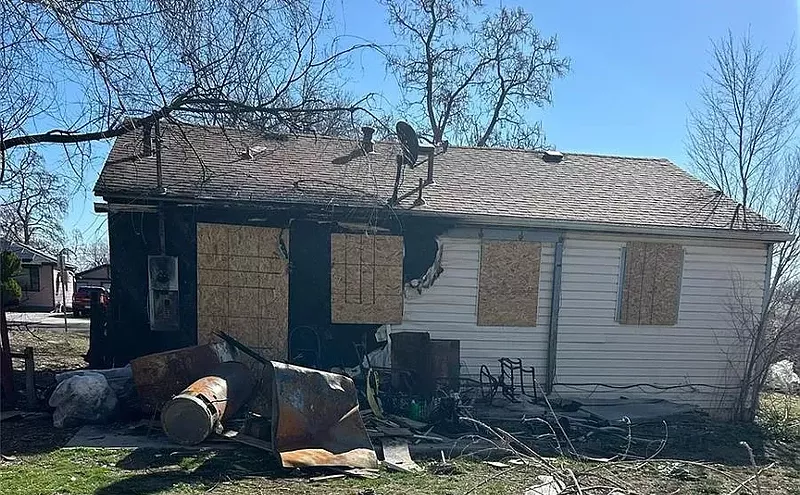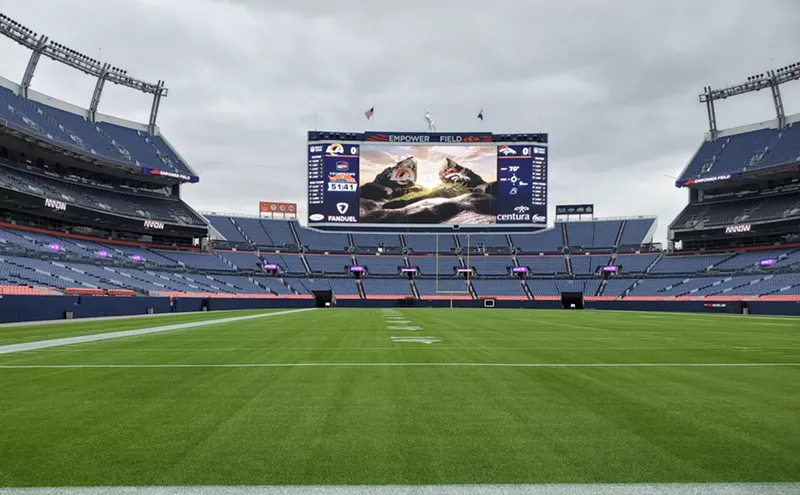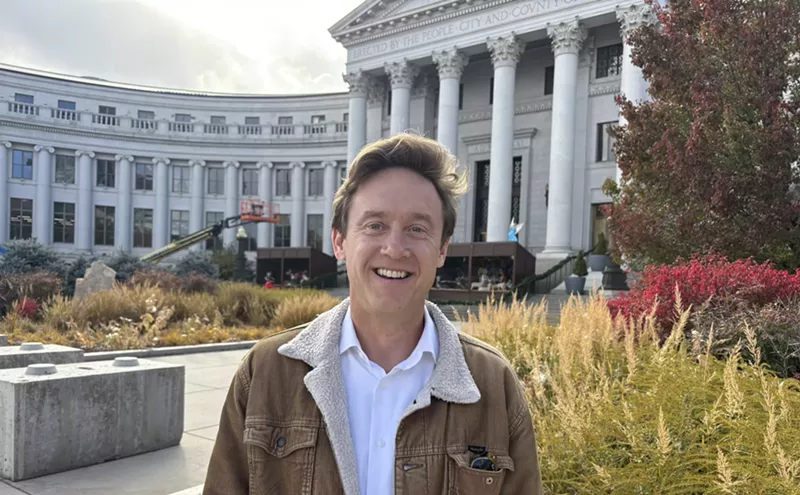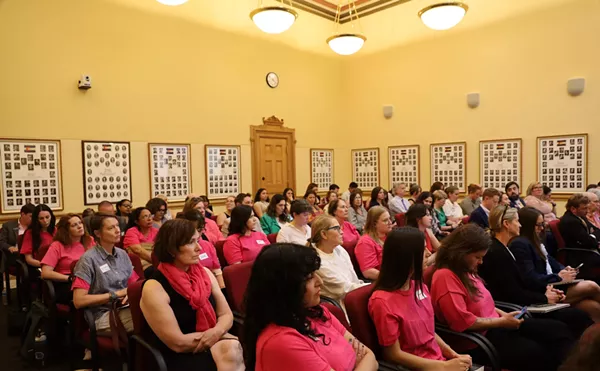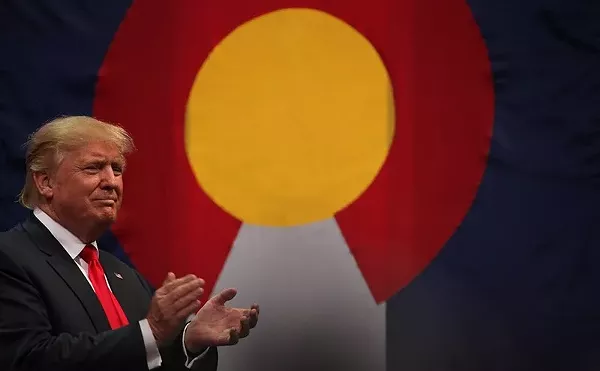Late in the afternoon on the last Friday of every month, bicyclists in 400 cities around the world gather for Critical Mass, a community bike ride that's taken off on every continent except Antarctica, according to www.critical-mass.org. But don't make the mistake of thinking that website speaks for the group, because "Critical Mass is not an organization, it's an unorganized coincidence," the site advises. "It's a movement...of bicycles, in the streets. Accordingly, this isn't the official Critical Mass web page, because there is no official Critical Mass web page. There are, however, a bunch of unofficial web pages."
And right now, people are spinning their wheels on [email protected], going nowhere fast. That's because last Friday night, two days after Critical Mass members met with Denver Police Department officials to make sure the April 28 ride went smoothly (the ride at the end of March not so much, as several riders had their bikes impounded), seventy riders wound up with tickets. And not little tickets, either, but some $410 whoppers. The ride may have been hyped with a flier noting that Critical Mass helps "promote bicycling as a fun and healthy alternative to driving," but right now, it doesn't seem like a very cheap alternative.
Because of the problems in March, members of Critical Mass met on April 26 with Denver Police Department Deputy Chief Steve Cooper and Debra Dilley, commander of District 6. To bridge the gap between the least hierarchical group imaginable and the most, a few lawyers from the American Civil Liberties Union were along for the ride. "We were clear with the police that we don't represent Critical Mass or any of its riders," one meeting-goer advised the Yahoo group afterward, "and that even if we receive some 'ground rules,' that we cannot agree to do anything on the riders' behalf. What we can do at this point is be a conduit of information between Critical Mass and the Denver PD, and express our general legal concerns to them."
For her part, Dilley agreed to bring other officers down to the seal-fountain pool at Civic Center Park, the standard starting point for Denver's Critical Mass, that Friday afternoon to make sure everyone understood basic bike etiquette and the ground rules for the ride -- as much as there could be ground rules. In the meantime, the DPD would consult with police in San Francisco, where the ride goes smoothly every month.
At the appointed hour on Friday, more than a hundred riders gathered in Civic Center Park. As promised, Dilley was there, too, along with other cops who distributed pamphlets explaining city traffic rules: no more than two riders abreast, obey all signals -- the sort of stuff most people learn when they move from trikes to two-wheelers. And then the riders were off, heading down 15th Street into downtown.
Max Absher, a representative of Copwatch, was there to observe the action. He watched some police talk to the riders, watched others film the riders (which seemed suspiciously close to violating the city's agreement that ended the Spy Files case). "I got the feeling they were really trying to cover their ass," he says. When the ride started, "I was following a few unmarked police cars, and I lost them," he continues. "They kind of jetted down 17th, and that's where I saw Critical Mass going right at Tremont." That's also where he saw the police cars turn on their lights and sirens and start ordering riders onto the sidewalks.
"I thought people were trying to work with the police on it," Absher says. "People were hanging out in a park, going on a bike ride. I don't think the police have any respect for them at all. They're not de-escalating the situation. They're only creating resentment."
Aaron Cary feels that resentment. For the past two years, his bicycle has been his only means of transportation; he's been riding with Critical Mass since November. "The motorists kind of get over it," he says of the monthly event. "It's always been very peaceful until the cops show up."
Outside the Brown Palace, the cops corralled the riders, blocking off streets at 17th and Tremont -- which snarled traffic flow even worse than the ride had -- and "told everyone to get off their bikes and get down," Cary remembers. "The show of force was over the top."
When he was a bike messenger -- a profession renowned for flaunting authority, and fast -- Cary never got a ticket. But he did last Friday.
Shawn Kumar rode with Critical Mass in the late '90s in San Francisco, where bike messengers started the ride about ten years ago and it quickly hit critical mass. When he moved to Denver, Kumar brought the Critical Mass concept with him. From its days here as a two-person event, it's "grown into its own animal," he says. "I attend once in a while. I thought I'd better go this past Friday."
As the ride started, he held back, "trailing up the rear, taking photos and expecting that something bad might happen," he says. "I just had that feeling."
He was right. By the time he got to the Brown Palace, the police were pulling riders over. "They were waiting for them like salmon coming up the stream," he says. A motorcycle cop told him to "pull over," then rode up on the sidewalk and ran into Kumar's bike. Kumar fell and cut his knee. "I was in shock that it actually happened," he says. "I was really stunned that he did that."
Denver has a reputation for being one of the best cities in the country for bicycles. But you're not going to prove it by the riders in Critical Mass. "I think they hate us," Cary says of the cops. "I think the term 'cowtown' fits."
"We tried to persuade them into using more moderate procedures used in cities where police departments seem to accommodate the ride," the ACLU's Mark Silverstein says. "I don't think we were successful."
But according to DPD spokesman Sonny Jackson, the riders themselves failed to follow the rules. "The individuals riding the bikes didn't obey the traffic laws," he says. "Commander Dilley had warned them, but they didn't follow. For public-safety reasons, they stopped them." And then issued seventy citations ranging from disobedience to a traffic signal, to making prohibited turns, to impeding traffic.
But at least the police didn't take any bikes this time. Then again, they didn't confiscate Chief Gerry Whitman's car after photo radar captured him speeding in it, either.
The ACLU has yet to get the rundown on all the tickets issued April 28, so the attorneys there aren't sure of the group's next move. On CriticalMassDenver, people are comparing notes and throwing around legal strategies, and there's already talk of a benefit at Bar Bar (that's the Carioca Cafe, for those not in the know) on June 11 to raise money for legal fees.
Before that, though, there will be the ride on May 26. "I think we're willing to do whatever we can to make this work," Jackson says. "But disobedience to the law is disobedience to the law." Except in San Francisco, perhaps. There, after Critical Mass grew to 5,000 riders, "the mayor just said, 'Look, let it go,' Jackson reports. "We truly don't see that we can do that here."
But the non-leaders of Critical Mass think Denver can. "The route is tiny, and, realistically, people in their cars would maybe be delayed three to five minutes," Kumar says. "By the time the light changes, the riders would be gone."
He understands police frustration with the event -- but not the DPD's inability to find a solution. "I see their point," he says. "But the point of Critical Mass is that we are traffic, too, and we need to be recognized as much as other vehicles."
In the meantime, he's recognized a few things about Denver: "One, policemen here are conservative, and two, it's not a bike-friendly town. But I will say this: Critical Mass has grown exponentially since the price of gas started going up."



